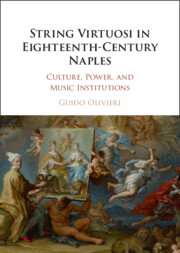Book contents
- String Virtuosi in Eighteenth-Century Naples
- String Virtuosi in Eighteenth-Century Naples
- Copyright page
- Dedication
- Contents
- Figures
- Tables
- Music Examples
- Acknowledgments
- Introduction
- 1 Music Institutions in Naples
- 2 The Formation of the Neapolitan String Virtuosi
- 3 Cello Virtuosi
- 4 Between Naples and Paris
- 5 Neapolitan Virtuosi in the Public Sphere
- 6 Neapolitan Instrumental Music under the Austrian Domination
- 7 Under the Wings of the Imperial Eagle
- Epilogue
- Bibliography
- Index
Introduction
Parthenope’s Violin
Published online by Cambridge University Press: 13 January 2024
- String Virtuosi in Eighteenth-Century Naples
- String Virtuosi in Eighteenth-Century Naples
- Copyright page
- Dedication
- Contents
- Figures
- Tables
- Music Examples
- Acknowledgments
- Introduction
- 1 Music Institutions in Naples
- 2 The Formation of the Neapolitan String Virtuosi
- 3 Cello Virtuosi
- 4 Between Naples and Paris
- 5 Neapolitan Virtuosi in the Public Sphere
- 6 Neapolitan Instrumental Music under the Austrian Domination
- 7 Under the Wings of the Imperial Eagle
- Epilogue
- Bibliography
- Index
Summary
Neapolitan instrumental music has been sidelined by modern scholarship. A focus on opera has for a long time completely obscured the existence of local instrumental traditions in Naples, usually considered peripheral to the main developments of the string repertory. The review of documentary evidence and discovery of new sources brings the reassessment of the central role that the string virtuosi had in the construction of the myth of Naples as music capital. The methodological approaches and criteria used in this study invite a reconsideration of the concepts of center and periphery and of the definition of Neapolitan instrumental “school.” Most of the composers considered were born in the provinces of the kingdom but were trained in the Neapolitan conservatories and thus participated in shared common pedagogical approaches and stylistic trends. A detail from a painting by Paolo de Matteis, which shows the mythical founder of the city, the siren Parthenope, rising from the ocean and accompanying her singing with a violin, is used as a metaphor for the emergence of string music in the early eighteenth century. The development of a distinct string tradition spans from the early career in Naples of virtuosi, such as Lonati and Matteis, after the catastrophic plague of 1656, to the appointment of Alessandro Scarlatti at the helm of the Cappella Reale in 1684.
Keywords
- Type
- Chapter
- Information
- String Virtuosi in Eighteenth-Century NaplesCulture, Power, and Music Institutions, pp. 1 - 19Publisher: Cambridge University PressPrint publication year: 2023

